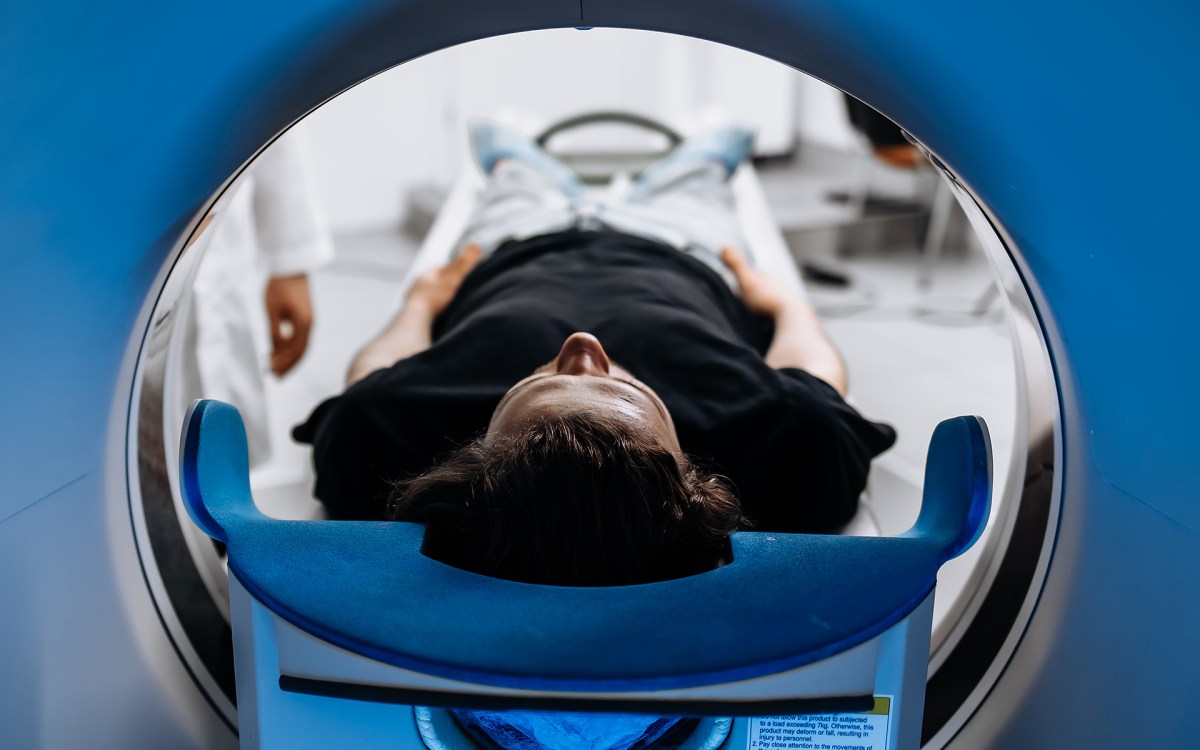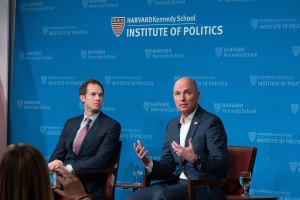Tag: Research
-
Health
Flavonoid-rich diet helps women decrease risk of ovarian cancer
New research out of the Channing Laboratory at Brigham and Women’s Hospital (BWH) reports that frequent consumption of foods containing the flavonoid kaempferol, including nonherbal tea and broccoli, was associated with a reduced risk of ovarian cancer.
-
Health
A smaller world, but not more intimate
Our increasingly interconnected world has made it easier for information and disease to spread. However, a new study from Harvard University and Cornell University shows that fewer “degrees of separation” can make social networks too weak to disseminate behavioral change. The finding that “small world” networks are limited in their power to shape individual behavior…
-
Health
Fellow’s focus is foggy, froggy forest
In the dark of the Sri Lankan cloud forest, the researchers’ only guide was the headlamps they used to light up the night, illuminating the cold, gray mist that drifted through the trees.
-
Health
Genome study charts genetic landscape of lung cancer
An international team of scientists Sunday (Nov. 4) announced the results of a systematic effort to map the genetic changes underlying lung cancer, the world’s leading cause of cancer deaths.
-
Science & Tech
White dwarf ‘sibling rivalry’ explodes into supernova
Astronomers at the Harvard-Smithsonian Center for Astrophysics (CfA) have found that a supernova discovered last year was caused by two colliding white dwarf stars.
-
Health
Researchers track down arthritis gene
Researchers at Brigham and Women’s Hospital and the Broad Institute of MIT and Harvard have discovered a gene involved in rheumatoid arthritis, a painful inflammation that affects 2.1 million Americans and which can destroy cartilage and bone within the afflicted joint.
-
Science & Tech
Holdren talks back to skeptics of global warming
“Global warming is a misnomer,” said John P. Holdren, speaking Tuesday night (Nov. 6) at the John F. Kennedy Jr. Forum at the Kennedy School. “It implies something gradual, uniform, and benign. What we’re experiencing is none of these.”
-
Health
Routine screening test examines substance abuse prevalence among teens
Approximately 15 percent of teens receiving routine outpatient medical care in a New England primary care network had positive results on a substance abuse screening test, according to a report in the November issue of Archives of Pediatrics & Adolescent Medicine, one of the JAMA/Archives journals.
-
Health
Decoding effort reveals fly species’ DNA
An enormous effort to decode the DNA of one of science’s most important laboratory animals — the fruit fly — ended in success this week as a collaboration of researchers from 16 nations announced the sequencing of 10 fly species’ genomes.
-
Campus & Community
HMS Dean Flier hails new, cooperative era in Harvard science
Harvard Medical School Dean Jeffrey Flier said Friday (Nov. 2) that new approaches are needed to advance the fight against disease and embraced cross-institutional collaborations at Harvard as a way to bring new thinking to old problems.
-
Science & Tech
Engineered weathering process could mitigate global warming
Researchers at Harvard University and Pennsylvania State University have invented a technology, inspired by nature, to reduce the accumulation of atmospheric carbon dioxide (CO2) caused by human emissions.
-
Campus & Community
‘Politics, social movements’ focus of fellows
James Duncan Phillips Professor of Early American History Joyce Chaplin, director of the Charles Warren Center for Studies in American History, has announced the names of nine resident scholars participating in the center’s 2007-08 workshop, “Politics and Social Movements.” Leading the workshop are Lisa McGirr, professor of history, and Daniel Carpenter, professor of government.
-
Health
Changes in diet and lifestyle may help prevent infertility
Women who followed a combination of five or more lifestyle factors, including changing specific aspects of their diets, experienced more than 80 percent less relative risk of infertility due to ovulatory disorders compared to women who engaged in none of the factors.
-
Campus & Community
Statistics captures unpredictability of real world
Harvard’s small but active statistics department celebrated its 50th anniversary last week. There were two days of lectures and panels Oct. 26-27 at the Gutman Conference Center, and a noisy, social, and musical banquet at the Harvard Club of Boston.
-
Health
Scientists image vivid ‘brainbows’
By activating multiple fluorescent proteins in neurons, neuroscientists at Harvard University are imaging the brain and nervous system as never before, rendering these cells in a riotous spray of colors dubbed a “Brainbow.”
-
Health
Med students don’t study war, ethics
A new survey of U.S. medical students shows they receive little training about what they should or should not do in wartime, despite ethical questions over physician involvement in prisoner interrogation and a legal framework making a “doctor draft” possible.
-
Campus & Community
Faust, Pilbeam greet freshman parents
To an assemblage of 1,000 freshman parents on Oct. 26 in Sanders Theatre, Dean of Harvard College David R. Pilbeam offered a welcome. “Your freshman is already a member of the extended Harvard family.”
-
Campus & Community
Berkman named director of Center for Population and Development Studies
Social epidemiologist Lisa Berkman has been appointed director of the Harvard Center for Population and Development Studies, Harvard Provost Steven E. Hyman announced today (Oct. 26).
-
Health
DNA reveals Neanderthal redheads
Ancient DNA retrieved from the bones of two Neanderthals suggests that at least some of them had red hair and pale skin, scientists report this week in the journal Science. The international team says that Neanderthals’ pigmentation may even have been as varied as that of modern humans, and that at least 1 percent of…
-
Health
Lava provides window on early Earth
Researchers at Harvard and the University of Hawaii believe they’ve resolved a long-standing controversy over the roots of islands — volcanoes in the middle of tectonic plates — showing that the islands’ lava provides a window into the early Earth’s makeup.
-
Science & Tech
New laser nanoantenna shows unprecedented detail
In a stunning feat of nanotechnology engineering, researchers from Harvard University have demonstrated a laser with a wide-range of potential applications in chemistry, biology, and medicine. Called a quantum cascade (QC) laser antenna, the device is capable of resolving the chemical composition of samples, such as the interior of a cell, with unprecedented detail.
-
Science & Tech
Massive black hole smashes record for sizeMassive black hole smashes record for size
Using two NASA satellites, astronomers have discovered a black hole that obliterates a record announced just two weeks ago. The new black hole, with a mass 24 to 33 times that of our sun, is the heftiest known black hole to orbit another star.
-
Science & Tech
If not in atmosphere, where does carbon go?
A prominent atmospheric scientist Monday (Oct. 29) called for more research into natural carbon “sinks,” which today absorb almost half of man-made carbon dioxide released into the atmosphere and which will play a large role in determining the extent of future global warming.
-
Campus & Community
Shell makes 5-year gift to fund Harvard energy policy research
Harvard’s Kennedy School of Government (KSG) is the recipient of a five-year $3.75 million donation from the Shell Exploration & Production Co., KSG Dean David T. Ellwood recently announced. The funds will be used to enhance and expand University research efforts on critical issues of energy policy.
-
Campus & Community
Harvard president announces task force on the arts
Harvard President Drew Faust announced today (Nov. 1) that she is creating a University-wide task force to examine the place of the arts at Harvard. Chaired by Cogan University Professor Stephen Greenblatt, the task force draws its membership from faculty, students, and others across the University who represent many fields and modes of engagement with…
-
Campus & Community
Du Bois Institute announces appointment of 20 fellows for 2007-08
Henry Louis Gates Jr., Alphonse Fletcher University Professor and director of Harvard’s W.E.B. Du Bois Institute for African and African American Research, has announced the appointment of 20 new fellows for the 2007-08 academic year.
-
Campus & Community
Harvard-Yenching Institute names doctoral fellows
Initiated in the 1960s, the Harvard-Yenching Institute’s Doctoral Scholar Program (DSP) now consists of two branches — Harvard-DSP and Non-Harvard DSP. Each year the institute invites Harvard departments of the humanities and social sciences to nominate candidates for the Harvard-DSP scholarship. Although not necessarily faculty members or researchers, these candidates must be from Asia.
-
Campus & Community
Kuwait Program Research Fund accepting grant proposals
The Kennedy School of Government (KSG) has recently announced the 13th funding cycle for the Kuwait Program Research Fund. With the support of the Kuwait Foundation for the Advancement of Sciences, a KSG faculty committee will consider applications for one-year grants (up to $30,000) and larger grants for more extensive proposals to support advanced research…
-
Health
Steven Pinker’s ‘Ideas on the Fringe’
Not long ago, Steven Pinker appeared on “The Colbert Report.” He managed to explain the functioning of the human brain to Stephen Colbert in only five words: “Brain cells fire in patterns.”
-
Health
Panel investigates media reporting on science and politics of stem cells
Stem cells, politics, “fairness,” and what one participant termed “the disintegration of traditional journalism,” were all on the bill at Thursday night’s (Oct. 18) public forum titled “Stem Cells and the Media,” hosted by the Harvard Stem Cell Institute.


